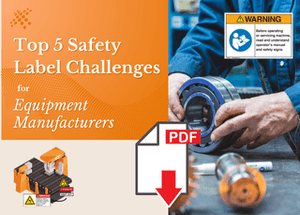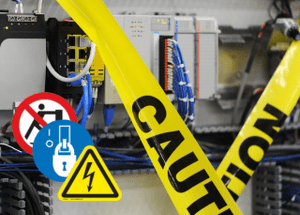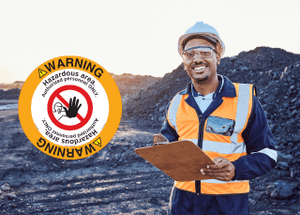Machine Maintenance Safety Tips

A Primer
on Machine Maintenance
At Clarion Safety Systems, we know that, to quote a popular
saying, “safety is no accident.” We believe that with some forethought,
planning, training and signage any workplace can be made safe for its workers
and customers. The area of machine maintenance safety is crucial since these
workers will be in harm’s way for much of their workday. Hot equipment, moving
parts, chemicals and sharp edges can cause burns, cuts and broken bones.
Therefore, it is essential that best practices are followed at all times. It’s
easy for workers and management to get complacent about safety so we provide
safeguards against this and proven techniques to ramp up the level of safety.
The
Statistics on Workplace Accidents
According to the Occupational Safety and Health Administration,
which oversees the safety of 130 million workers in the U.S., serious accidents
occur far too frequently. While the majority of these accidents don’t result in
fatalities, 5,147 workers died on the job from injuries in 2017. The four most
common causes of deaths in the workplace were the result of the following
events:
- Falls with 381 deaths attributed to this source
- Struck by object with 80 deaths
- Electrocutions with 71 deaths
- Caught-in-between objects with 50 deaths
Pretty much all of these categories could be in the realm of machine maintenance safety. OSHA also keeps track of the most common citations issued for workplace deficiencies. Of the top citations, many of these could also be related to machine maintenance, including inadequate hazard safety communications, poor control of lockout/tagout (LOTO) procedures, poor machinery guarding and insufficient protections for eyes. Not following best practices results in many more injuries and deaths to workers each year.
Get Our Free 2022 ANSI & ISO Guide - Designed for Manufacturers
At Clarion Safety Systems we understand the power of proper signage in keeping the workplace safe. We’ve studied the science of semiotics—how signs and symbols communicate—for over 30 years. Effective signage isn’t just a matter of putting up a sign or a warning label and then letting it sit for the next five years. For signs to be effective they need to be read by the workers. It’s crucial to have multilingual signs if your company has a diverse workforce. Here are a few things to improve signage for your company:
- Change and update signage frequently
- Have service talks that point out the importance of obeying the signs
- Guard against workplace complacency
- Incorporate bright colors and large signs
- Move the position of the signage from time to time
- Meet the legal requirements of the regulatory agencies
We offer a full line of effective signs to communicate to your workers in the maintenance field as well as throughout the plant, work site or office. For the maintenance craft we have signs for electrical hazards, conveyer belt warnings, hazardous materials, confined space , burn hazards and many more. Since maintenance personnel have to go where the problems are, they often need to go just about everywhere at work.
If there’s something we don’t have, or if you have an idea of your own, we offer customized signing in three simple steps. We can also translate the message into multiple languages.
The Upkeep
of Safety Labels
Best practice safety labels not only alert workers to a nearby
hazard, they also make sure your company is compliant with the latest
standards. Since regulations by OSHA, ANSI, ISO, WEE and others change frequently,
it’s important to make sure you have the latest and greatest labels on your
equipment and in the correct places. Proper labeling reduces your vulnerability
to lawsuits in the case of an injury. We carry labels that cover trips, slips
and falls, thermal hazards, material handling, PPE equipment, radiation,
security and more.
The Role
of Lockout and Tagout Signage
LOTO labels are designed to spell out the proper procedures for
shutting down a machine. This could occur for many reasons, but it is often
needed when maintenance is working to fix a malfunction. Oftentimes the worker
is in an area where he or she cannot be seen. If the machine were to be started
at this time, the worker could get seriously injured. Personnel could get
electrocuted, cut, burned or suffer eye damage if the machine were to be
started at the wrong time.
Our signs follow OSHA and ANSI graphics and formatting to alert all workers that a lockout is in process. We offer a full line of lockout/tagout signage , including the following options:
- Danger/Electrocution Hazard Tag
- Danger/Crush Hazard – Chain Drive Tag
- Danger/Crush Hazard – Full Body Tag
- Danger/Cutting Hazard Tag
Each tag includes additional information to workers. Employees are clearly informed not to remove the tag until authorized.
Tips for
Safely Servicing a Machine
When servicing a machine or piece of equipment, it is important to
follow all safety procedures to avoid any potential health and safety hazards. Only
qualified personnel should complete repairs. Utilizing operator manuals is
highly advised as they contain information about the proper ways to fix a
downed machine. Applying
read technical manual
before servicing labels
to your equipment encourages machine safety best
practices and helps minimize the risk of equipment damage. Creating
customized
safety instruction labels
specific to your machinery and safety needs is
also recommended. Failure to adhere to operating instructions could cause
serious injury or death in addition to the imposition of hefty fines and sanctions by various
health and safety boards.
The Path
to Best Practices
At Clarion Safety Systems, we can help your workplace become
legally compliant and protect your workers from preventable injuries. It’s not
always an easy process, but our over 30 years of experience will help you
achieve your safety goals. Contact us today to find out how we can provide your
company with the solutions needed to increase your machine maintenance safety
strategy.



